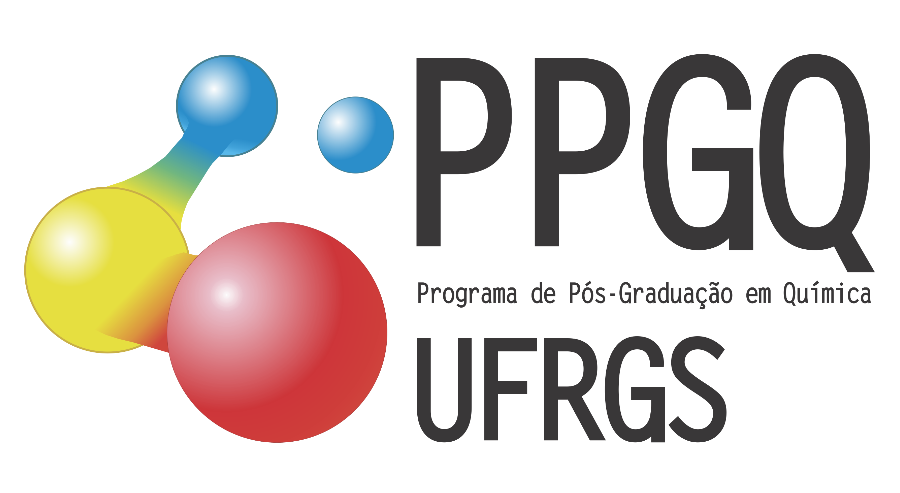PPGQ Courses of Study
Mandatory
QUP016 - Seminars
Summary: This course intends to provide students with the necessary information for the presentation of scientific seminars, through the discussion of the different stages involved in it and the presentation of a seminar involving contents in the area of Chemistry, at the Master's and Doctorate levels.
Credits: 2 (30h) - Syllabus
Evaluation Form template here.
Professor Control Form template here.
Summary for Promotion Template here.
QUP301 - Advanced Inorganic Chemistry
Summary: Molecular symmetry and group theory. Bonding theories in coordination compounds. Stability and thermodynamic aspects of coordination compounds.
Credits: 3 (45h) - Syllabus
QUP302 - Advanced Organic Chemistry
Summary: Organic Physical chemistry applied to elucidate mechanisms of organic reactions; conformational effects and chemical reactivity in cyclic and acyclic systems.
Credits: 3 (45h) - Syllabus
QUP303 - Advanced Physical Chemistry
Summary: Classical thermodynamics of ideal and non-ideal systems. Alternative formulations of the second principle. Non-equilibrium thermodynamics: fundamentals, linear and non-linear regime and dissipative structures.
Credits: 3 (45h) - Syllabus
QUP314 - Learning methodologies in higher chemistry education
Summary: Epistemological and pedagogical aspects of teaching and learning processes in chemistry education; fundamentals for teacher education in higher chemistry education.
Credits: 3 (45h) - Syllabus
QUP336 - Advanced Analytical Chemistry
Summary: Statistical methods applied to Analytical Chemistry. Errors and data treatment. Validation of analytical methodology. Calibration. Activity coefficient and Debye-Hückel theory. Advanced studies of chemical equilibrium involving acid-base, solubility, complexation, and oxy-reduction. Analytical chemistry in non-aqueous solvents.
Credits: 3 (45h) - Syllabus
Elective
QUP006 - Theoretical Polymer Chemistry
Summary: Introduction to Polymers, Step and Radical Chain Polymerization. Ionic Polymerizations, Chain, and Ring-Opening Copolymerization. Polymerization Processes. Stereochemistry of Polymerization and Polymer Reactions.
Credits: 3 (45h) - Syllabus
QUP008 - Physical Chemistry of Polymers
Summary: Chain Dimensions. Thermodynamics of Polymer Solutions. Determinations of Molecular Weight in Solution. Thermo-Mechanical and Viscoelastic Properties and Elasticity Theory of Rubber; Relationship Structure and Physical Properties.
Credits: 3 (45h) - Syllabus
QUP009 - Organometallic Chemistry
Summary: Properties. Metal-Carbon Bond Formation of Representative Elements. Organometallic compounds of transition metals: chemical bonding and reaction mechanisms. Organometallic catalysis. Applications in organic synthesis and materials.
Credits: 3 (45h) - Syllabus
QUP011 - Advanced Classical Theoretical Chemistry
Summary: Fundamentals of Classical and Statistical Mechanics. Statistical thermodynamics in different ensembles. Statistical Thermodynamics of Real and Liquid Gases. Molecular dynamics, computational implementation, and applications of molecular dynamics, Markov processes, Monte Carlo method. Brownian dynamics, hybrid methods.
Credits: 3 (45h) - Syllabus
QUP017 - Organic Synthesis
Summary: The course aims to address advanced aspects of organic synthesis dynamically and attractively. The main focus will be centered on recent results from the literature, on topics of current interest to the international scientific community. Special emphasis will be given to applications aimed at the synthesis of molecules with outstanding biological activity. Additionally, the objective is to discuss in detail fundamental aspects such as chemo-, regio- and stereochemistry.
Credits: 3 (45h) - Syllabus
Summary: Homogeneous catalysis. Reaction quantities. Coordination and organometallic chemistry in catalytic processes. Main classes of processes in homogeneous catalysis. Industrial processes in homogeneous catalysis. Heterogeneous catalysis. Adsorption phenomena. Solid supports, surface modification of supports with organic groups, metals, oxides, and complexes. Characterization methods. Main industrial processes in heterogeneous catalysis. Ziegler-Natta Catalysis. Study of molecular and surface catalytic systems: synthesis, characterization, properties, and applications of homogeneous and heterogeneous catalytic precursors.
Credits: 3 (45h) - Syllabus
QUP032 - Chromatographic Methods of Analysis
Summary: Classification of chromatographic systems. Definitions. Qualitative and quantitative analysis. Equipment. Recent advances in Gas and Liquid Chromatography. Coupled techniques: GC/MS and GC/FT-IR. Applications.
Credits: 3 (45h) - Syllabus
QUP053 - Photochemistry. Principles and Applications
Summary: Basic principles and applications of photochemistry in homogeneous and heterogeneous systems. Primary and total photochemical processes. Photochemical mechanisms. Physical and chemical deactivation of excited states. Atmospheric and stratospheric photochemistry. Photocatalysis. Hydrogen photogeneration. Solar cells. Functionalization of photon-induced polymers. Light Curing. Photochemistry on surfaces.
Credits: 3 (45h) - Syllabus
QUP142 - Advanced Statistical Thermodynamics
Summary: Introduce the student to physicochemical concepts of real systems and their evolution over time. Statistical Mechanics of Real Systems, Fluctuations. Time dependence.
Credits: 3 (45h) - Syllabus
QUP143 - Methods in Electronic Molecular Structure
Summary: Quantum Mechanics Principles. Wave functions for many-electron systems. Hartree-Fock Method. Base Sets. Complete Base Set Models. Electronic correlation. Embedding
methods of electronic correlation: Configuration Interaction, Moller-Plesset Disturbance Theory, and Coupled Clusters Theory. Density Functional Theory. Semi-empirical methods.
methods of electronic correlation: Configuration Interaction, Moller-Plesset Disturbance Theory, and Coupled Clusters Theory. Density Functional Theory. Semi-empirical methods.
Credits: 3 (45h) - Syllabus
QUP152 - Chemometrics
Summary: Exploratory Analysis: PCA and HCA. Fundamentals and applications in environmental chemistry, food chemistry, pharmaceutical chemistry, and in the area of fuels and biofuels. Pattern recognition techniques. Fundamentals and applications in food analysis, petrochemical, and drug analysis. Multivariate regression. Fundamentals and applications in instrumental techniques, environmental chemistry, food chemistry, pharmaceutical chemistry, and in the area of fuels and biofuels.
Credits: 2 (30h) - Syllabus
QUP153 - Advanced Computational Chemistry
Summary: UNIX Operating System: Shell scripting. FORTRAN 90: Programming basics. Quantum Chemistry Algorithms.
Credits: 3 (45h) - Syllabus
QUP154 - Biocatalysis and enzymatic technology
Summary: Introduction to biocatalysis and enzymatic technology. Understanding and utilization of enzymatic reactions in processes. Isolation and purification of enzymes. Enzymatic kinetics studies with and without the presence of inhibitors. Study of applications involving enzymes.
Credits: 3 (45h) - Syllabus
QUP167 - Biosensors: Fundamentals and Applications
Summary: This course provides an overview of biosensors, their principles, and their applications. Electrochemical, optical, piezoelectric, and calorimetric biosensors are presented in detail, emphasizing the immobilization of biological materials, support materials, properties, and characteristics of biosensors, as well as factors influencing analytical performance.
Credits: 2 (30h) - Syllabus
QUP169 - Nuclear Magnetic Resonance II
Summary: Fundamentals of the NMR phenomenon, advanced techniques in 1D and 2D, recent trends in NMR (fundamentals of pulse techniques), and recent trends in applications of NMR.
Credits: 3 (45h) - Syllabus
QUP173 - Supramolecular Chemistry
Summary: Theoretical aspects involved in non-covalent intermolecular interactions, mechanisms of molecular recognition, self-association, and principles of supramolecular photochemistry. The principles that guide supramolecular chemistry and potential applications will be discussed.
Credits: 2 (30h) - Syllabus
QUP175 -Scientific Research Methodology
Summary: The scientific method. The researcher and the scientific communication. Ethics and Scientific Research. Literature revision. Structure and dynamics of a research project. Structure and dynamics of a scientific article. Oral communication of research results. Writing, critique, and review practices of a research project (in Portuguese) and a scientific article (in English).
Credits: 2 (30h) - Syllabus
QUP177 - Nuclear Magnetic Resonance I
Summary: Fundamentals of the NMR phenomenon, the relationship between NMR spectra and molecular structure. Routine spectra (1H and 13C): Homo- and heteronuclear correlation (COSY, TOCSY, HSQC, HMBC), Emphasis is on learning the practical and interpretation of NMR spectra of organic compounds.
Credits: 3 (45h) - Syllabus
QUP179 - Sustainability and Environmental Education
Summary: Sustainability: definitions and meanings, Meanings of Sustainability, Sustainability and environmental education, Scientific and technological education, sustainability and the CTS approach.
Credits: 2 (30h) - Syllabus
QUP180 - Scientific Filming
Summary: Filming in science. Scientific dissemination and digital media. Video production and editing.
Credits: 3 (45h) - Syllabus
QUP332 - Nanochemistry: Fundamentals and Applications
Summary: This course covers the concepts of nanochemistry, succinct history of nanoscience, surface effects, synthetic strategies of nanobeads, nanowires, carbon nanotubes, and their
based structures, metal nanoparticles, graphene, and their applications.
based structures, metal nanoparticles, graphene, and their applications.
Credits: 2 (30h) - Syllabus
QUP403 - CO2 Chemistry - Technologies and New Materials
Summary: Environmental impact. Energy generation processes. Physicochemical properties and CO2 capture. Use of CO2 for advanced oil recovery. Catalytic production of CO and synthesis gas. Photochemical production of hydrogen. Sustainable carbon economy. Catalytic processes for obtaining fuels. Comparison between technologies and perspectives for the future.
Credits: 3 (45h) - Syllabus
QUP404 - Medicinal Inorganic Chemistry
Summary: Metalloenzymes and metalloproteins in the human body.Metal complexes in medicine. Metallodrugs for the diagnosis and treatment of cancer, as antiparasitic and antimycobacterial agents, and for arthritis treatments.
Credits: 2 (30h) - Syllabus
QUP405 - Techniques used to study the interaction of organic and inorganic compounds with DNA
Summary: DNA structure, interactions types compound-DNA. Spectroscopic, analytical, physical, and biological techniques to determine the type and binding constants between organic and/or inorganic compounds with the DNA.
Credits: 2 (30h) - Syllabus
Special Topics
QUP015 - Special Topics in Dynamic Stereochemistry
Summary: Concepts and definitions of stereochemistry, chirality and pro-chirality relationships, stereoisomer, and chiropractic properties. Use the conceptual definitions in the study of case reactions - enantio- and diastereoselective transition state models aiming at learning optically active compounds synthesis methods.
Credits: 2 (30h) - Syllabus
QUP104 - Special Topics in Sample Preparation Methods in Analytical Chemistry
Summary: Approach to the main methods currently used in sample preparation for analytical measurements of organic compounds and chemical elements.
Credits: 2 (30h) - Syllabus
QUP109 - Special Topics in Pericyclic Reactions. Mechanism and synthetic aspects
Summary: Mechanism of electrocyclic, sigmatropic, and cyclic charge pericyclic reactions.
Credits: 2 (30h) - Syllabus
QUP113 - Special Topics in Atomic Absorption Spectrometry
Summary: Theoretical fundamentals and instrumentation. Atomic Absorption Spectrometry with flame, graphite furnace, and chemical vapor generation. High-Resolution Continuous Source Atomic Absorption Spectrometry. Steps of an analytical method.
Credits: 2 (30h) - Syllabus
QUP130 - Special Topics in Multidimensional Chromatography
Summary: Introduction to multidimensional chromatographic techniques, history, fundamentals, instrumentation, modulators, nomenclature, abbreviations, GCxGC complex mixture analysis (petroleum and derivatives, fixed oils, essential oils, aromas and fragrances, environmental samples, biological samples, forensic samples, etc), future perspectives.
Credits: 2 (30h) - Syllabus
QUP148 - Special Topics in Nuclear Magnetic Resonance Applied to Polymers
Summary: Basic principles of NMR spectroscopy applied to polymers.
Credits: 2 (30h) - Syllabus
QUP170 - Special Topics in Physical Chemistry of Surfaces and Colloids
Summary: Approach properties and concepts such as contact angle. Flotation. Electrified interfaces: the electrical double layer. The van der Waals theory of forces. Interaction between double layers and particle coagulation. Association colloids. Self-organized nanostructures.
Credits: 2 (30h) - Syllabus
QUP176 - Special Topics in Chemometrics
Summary: Concepts in linear algebra and statistics. Multiway data generation and organization. Fundamentals and application of multiway calibration. Tucker Methods. Parallel factor analysis (PARAFAC and PARAFAC2). Multivariate Curve Resolution (MCR). Independent Component Analysis (ICA). Methods based on residual multilinearization (U-PLS, N-PLS). Data fusion. Figures of merit in calibration and classification.
Credits: 2 (30h) - Syllabus
QUP178 - Special Topics in Advanced Oxidation Processes Mediated by Solar Radiation
Summary: Topics on Advanced Solar Radiation-mediated Oxidation Processes, water treatment, coupling technologies, and valuation of experimental results in scientific publications.
Credits: 1 (15h) - Syllabus




